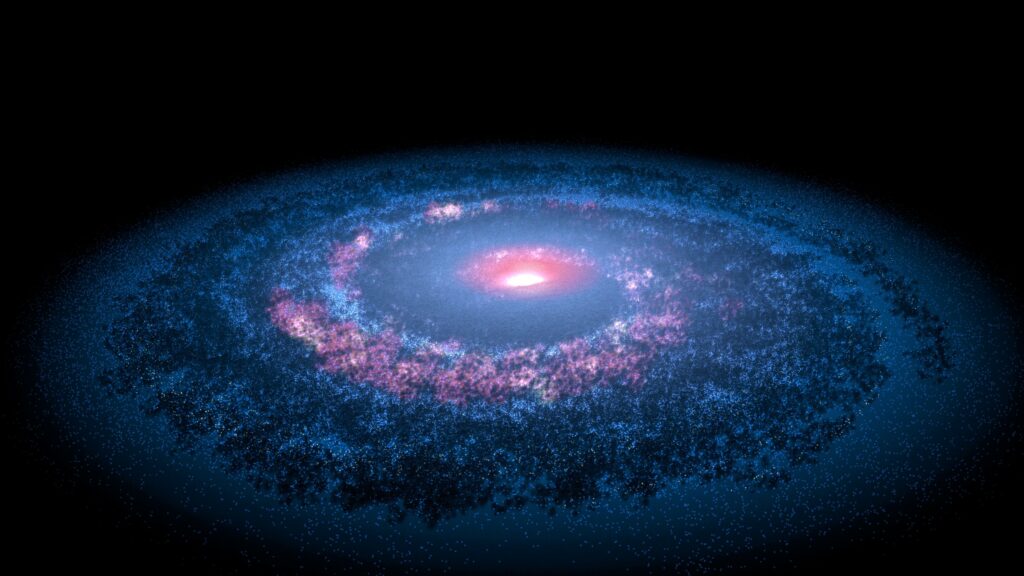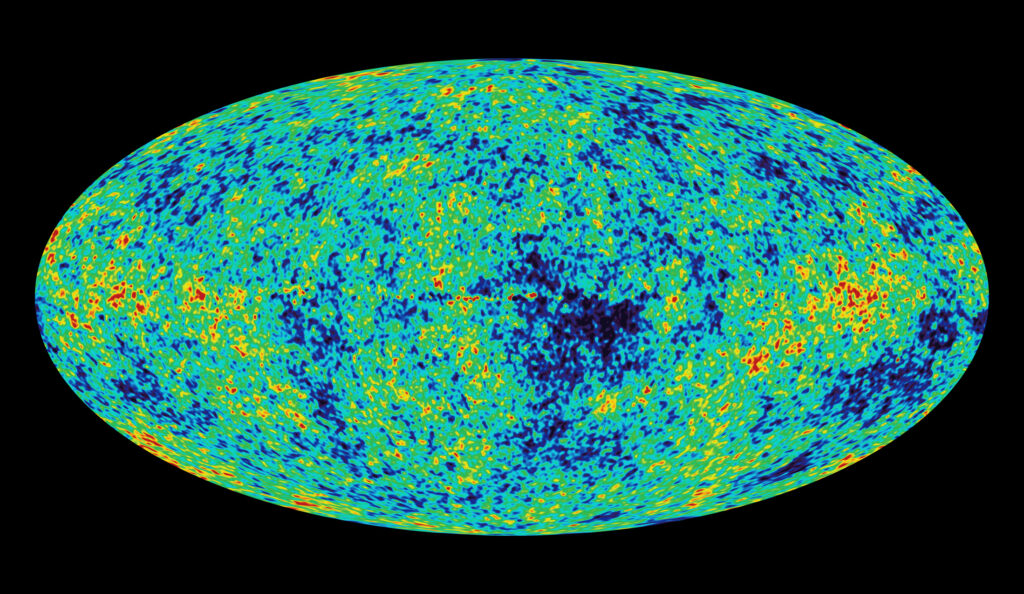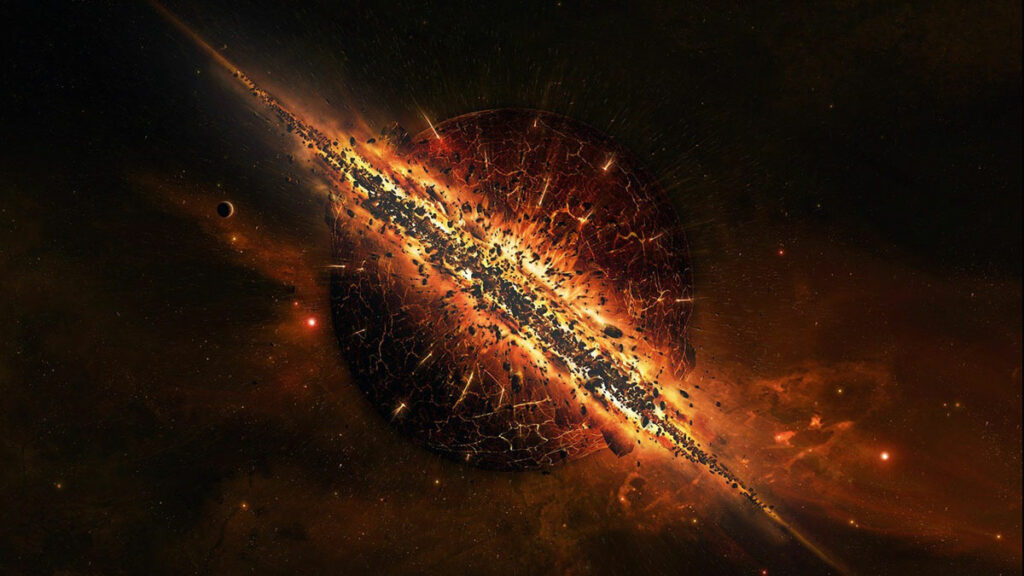Recent measurements suggest that the universe is ripping itself apart. Yes, you read that right—the universe might be in the middle of a cosmic breakup, and it’s not a clean one. But before we panic, let’s dive into the science and try to understand what’s really going on.
For years, the cosmic microwave background (CMB) has been the ultimate source of wisdom for cosmologists. This faint radiation, leftover from the Big Bang, has been our primary tool for understanding the universe’s expansion. The Planck satellite, a trusty piece of equipment, meticulously studied the fluctuations in the CMB and calculated the expansion rate of the universe—67 kilometers per second per megaparsec (or, to put it in more relatable terms, 67 km/s for every 3 million light-years). That seemed to settle the debate, at least for a while.
New Data, New Worries
But hold on! New data has thrown a cosmic wrench into the works. Fresh analyses of local expansions—meaning expansions in the relatively nearby parts of the universe—show something unexpected. Instead of 67 km/s, we’re now seeing expansion rates of 74 km/s per megaparsec. That’s like discovering your favorite ice cream shop is giving you a 9% bigger scoop than before. Great for your cravings, not so much for the universe’s stability.
These local expansions are measured in regions much closer to us, cosmologically speaking, rather than in the far-flung reaches of space where the CMB was formed about 400,000 years after the Big Bang. So, if the expansion is speeding up locally, does that mean something new is happening in the universe? Is this a sign that the universe is not only expanding but that the expansion is accelerating faster than ever before?
The Trouble with Expansion
Here’s the thing: We can’t measure the universe’s expansion from just anywhere. For example, you won’t notice the universe expanding in your living room—don’t worry, your sofa isn’t drifting away from the TV. Even within our own Milky Way galaxy, the expansion is too subtle to detect. In fact, it’s only at distances beyond 3 million light-years that we can start to observe this cosmic stretch. So, galaxies that are further than that are being pushed apart by the expansion of space itself. But why is this happening faster than expected?
It turns out that the expansion has been accelerating for some time. Back in 1995, researchers first discovered that the universe wasn’t expanding at a steady rate; instead, it was speeding up. This was the first clue that something strange was happening, and now, with the latest data, scientists think this acceleration might be accelerating itself. Yes, you read that right—an acceleration of the acceleration. It’s the cosmic equivalent of hitting the gas pedal twice!

What Could Be Causing This?
The big mystery here is what could be driving this ramp-up in cosmic speed. The current suspect is dark energy, that enigmatic force we still don’t fully understand. Dark energy seems to be pushing galaxies apart, and if these new measurements hold up, it might be doing so even more aggressively than we thought. If that’s the case, then we’re in for quite the ride.
Imagine it like this: At first, only distant galaxy clusters seem to be speeding away. Then, nearby clusters. Eventually, galaxies within our own local group might start to drift apart, followed by stars in our own galaxy. Fast forward even more, and maybe—just maybe—your car will disappear from your driveway, whisked away by the relentless expansion of the cosmos.
Okay, that’s a bit of an exaggeration (your car is safe… for now), but the point remains: If the acceleration continues unchecked, it could lead to the ultimate fate of the universe—a scenario where even atoms are pulled apart in a phenomenon known as the “Big Rip.”
Einstein Was Way Ahead of Us
As always, Einstein was way ahead of the game. In his original cosmological models, he considered three possibilities for the universe:
- The universe could expand and then collapse back in on itself, like a cosmic boomerang. Everything would eventually return to a single point.
- The universe could expand so quickly that no structure would ever form, resulting in a vast, empty void.
- The universe could expand at just the right rate—not too fast, not too slow—allowing stars, galaxies, and planets to form and evolve.
For a long time, the third option seemed to be the winner. The universe was expanding at a steady rate, allowing galaxies to form and stars to shine. But in recent decades, we’ve learned that things aren’t so simple. Instead of a steady expansion, we’re seeing acceleration—first discovered over 20 years ago and now seemingly increasing even faster.
The Dark Energy Dilemma
The culprit behind this rapid expansion appears to be dark energy, which acts like a cosmic anti-gravity force, pushing everything apart. And if dark energy is getting stronger, that could spell trouble for the universe. Right now, we don’t know if this is a temporary blip or a sign of things to come. Is dark energy going to continue accelerating, or will it eventually level off? That’s the million (or trillion) dollar question.
The good news is that we’re not in immediate danger of being torn apart. The distances involved are so vast that even if the acceleration continues, it would be billions of years before we’d see any noticeable effects. So, while it’s fun to speculate about the universe falling to pieces, we still have plenty of time to enjoy the night sky.

What Happens Next?
The future of the universe could go one of two ways. Either dark energy will continue to increase, causing galaxies, stars, and eventually atoms to be ripped apart, or it will settle into a steady rate, leaving the universe to expand indefinitely but without catastrophic consequences.
The current data suggests that the universe is accelerating faster than expected, but it’s not a guaranteed disaster just yet. Cosmologists are hard at work trying to refine their models, and with future measurements, we might get a clearer picture of what’s really going on.
For now, though, we can marvel at the fact that the universe is still full of surprises. Whether it’s expanding, accelerating, or doing something entirely unexpected, one thing’s for sure: the cosmos is far from boring.




Pingback: james